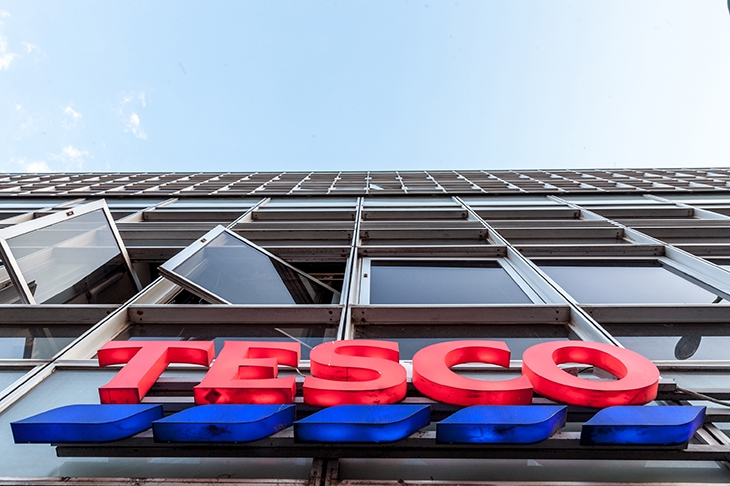How surprising to read one former Tesco chief, 82-year-old Lord MacLaurin, badmouthing another, Sir Terry Leahy. The surprise is because both were titans of their trade and Leahy has always been seen as Ian MacLaurin’s protégé: it was MacLaurin who took Tesco to the top of the UK supermarket league in the mid-1990s, then Leahy who quadrupled its sales, profits and share price between 1997 and 2011 to make it the monster we know. But Leahy also took Tesco into a disastrous US grocery venture and — according to MacLaurin, talking to the Sunday Times — started ‘the rot’ that brought the company low by 2014, leaving the blame to be taken by his own successor, Philip Clarke.
If, like me, you’re fascinated by the rise and fall of great companies, this is gripping stuff. At its nadir, I really thought Tesco might be in terminal decline as an ‘unloved, asset-heavy giant’ in a marketplace where consumers were rapidly shifting to online shopping and discount chasing. But Clarke’s successor, Dave Lewis, hired in from Uni-lever, tidied the mess, re-engineered the supply chain, focused on cheaper own brands to compete with Aldi and Lidl — and has brought profits roaring back.
The result is that many stockbrokers now rate Tesco shares a ‘strong buy’; indeed, we picked them for this column’s own UK Optimists Portfolio. Some analysts now think those edge-of-town megastores that had begun to look so redundant offer a killer advantage as online distribution centres, within easy reach of most of the population. And the same analysts think the threat from Aldi and Lidl has passed its zenith, since further acquisition of market share, particularly in the south of England, will be increasingly costly for them.
So the wheel of corporate fortune turns — and as in politics, history is rewritten by old men sniping from their armchairs. But meanwhile here’s a titbit that seems to confirm the last part of this narrative. Lidl’s very drinkable Comte de Senneval champagne has been slashed from a super–bargain £11.99 to an insane £9.99. That’s surely a sign of desperation.
Enjoy the golden season
Glastonbury, Glyndebourne, Wimbledon and The Spectator party combined with rising stock markets and fantasy spending promises to create a summer glow. But the news from the real economy is seriously worrying. Activity levels in UK manufacturing dropped in June to their lowest level since February 2013 — a period of relatively high activity when factories were stock-piling ahead of the March Brexit deadline having come to a halt at a moment when export demand is feeling a downturn in global trade. And the Purchasing Managers Index for the construction sector shows dramatic shrinkage in housebuilding and commercial property projects, largely blamed by the industry itself on Brexit and domestic political uncertainty. These, I’m afraid, will be big themes of the autumn: enjoy this golden season while you can.
Foot on the brake
I tried to take a positive view of Aston Martin’s overhyped flotation last October. ‘In these gloomy times for the wider industry,’ I wrote, ‘it’s good to find someone’ — I was referring to Aston chief Andy Palmer, who stood to make £20 million if he delivered his promises — ‘with his foot on the throttle.’ But the market didn’t like a valuation that placed Aston on a higher multiple than Ferrari and didn’t buy the idea that this would henceforth be a global luxury- goods brand rather than a mere builder of cars. The shares halved from their £19 float price, key Kuwaiti investors slimmed their holdings and the Italian private-equity firm that held 40 per cent before the float is now offering to increase its stake again, but at a more realistic £10 a share.
Following losses in 2018, recovery depends on the successful launch of a new SUV model later this year — and how well it sells in Asia. The marque will survive, as stylish marques generally do, but with all the current travails of car-making I wouldn’t bet on Aston-Martin remaining an independent listed company for long.
The next Jony Ive
Sir Jony Ive, the Chingford-born alumnus of Newcastle Poly who is stepping down as Apple’s chief design officer, made — in the minimalist beauty of the iPhone and the iPod — Britain’s greatest contribution to the digital age since Sir Tim Berners-Lee invented the World Wide Web back in 1989.
But the apotheosis of science and art that is Ive’s body of work for Apple is also a reminder of how little we have otherwise achieved in the great flowering of electronic communication and computing power of the past 30 years. Arguably, only two UK companies in the sector reached for global scale: the microchip maker Arm Holdings that was sold to SoftBank of Japan in 2016 for £23 billion; and the software group Autonomy, whose £8 billion acquisition by Hewlett Packard of the US in 2011 led to allegations of fraudulently inflated value that are currently being heard in the High Court.
A list of today’s ‘top ten thriving UK tech companies’ starts with Deliveroo, the takeaway carrier founded in London by two Americans, and the banking app Revolut, founded by two Russians. That’s not much of a scoresheet.
Yet the vast range of entries we’re now sifting for this year’s Economic Disruptor Awards reminds us there’s never a shortage of British ideas; and the relative lack of networks, incentives and capital that drives most of those ideas abroad before they reach commercial maturity has long been highlighted as a problem by ministers. Jeremy Hunt says he wants to ‘turbocharge’ the economy by backing innovators — but he’s way behind an opponent who says he’ll just throw money at everyone and, I suspect, really doesn’t care whether the next Jony Ive is already on a plane to California.







Comments